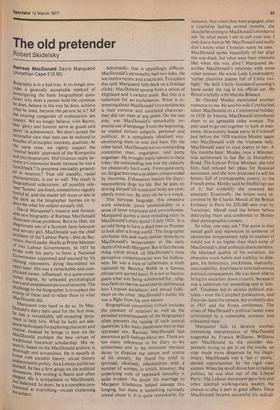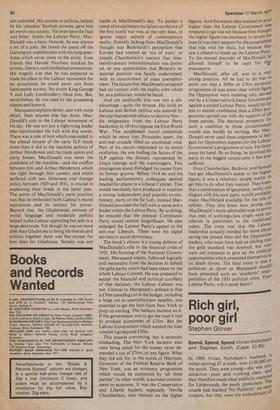The old pretender
Robert Skid elsky
Ramsay MacDonald David Marquand (Jonathan Cape £12.50)
Riography is in a bad way. It no longer provides a generally acceptable method of investigating the basic biographical questions: why does a person hold the opinions he does, behave in the way he does, achieve What he does, become the person he is? All the existing categories of explanation are suspect. We no longer believe, with Bacon, that 'glory and honour serve as goads and spurs' to achievement. We don't accept the rationalist view that men can be reduced to bundles of principles, interests, qualities. At the same time, we rightly suspect the mental health' approach of the Romantics and psychoanalysts. Did Gramsci really become a Communist leader because he was a hunchback ? Is greatness inevitably grounded in neurosis? That old standby, racial chiracteristics, is out as well. The result is biographical eclecticism: all possibly relevant 'factors' are listed, connections vaguely hinted at, and the reader left more or less in the dark as the biographer hurries on to describe what his subject actually did. David Marquand's massive and formidable new biography of Ramsay MacDonald illustrates those problems. Born in 1866, the iliegitimate son of a Scottish farm labourer and servant girl, MacDonald was the chief architect of the Labour Party—first as Secretary, then Leader, finally as Prime Minister of two Labour Governments. In 1931 he broke with his party to form a National G,overnment supported and manned by his Inelong opponents, dying discredited six Years later. His was a remarkable and comPlicated career, influenced, to a quite exceptional degree, by unhealed psychological scars and unappeased personal tensions. The challenge to the biographer is to explain the source of these and to relate them to what MacDonald did. Marquand tries hard to do so. In Macponald's diary here used for the first time, ne has a remarkably self-revealing docuMent to help him. What he lacks are adequate techniques for exploring character and motive, Instead he brings to bear on the MacDonald problem the best virtues of traditional historical scholarship. His research, based on the MacDonald archive, is thorough and scrupulous. He is equally at hcwle with socialist theory, social history arid economic poliey. As a Labour politician h d!mself, he has a firm grasp on the political jmension. His writing is fluent and often Sant. He is sympathetic to MacDonald, but balanced. In short, he is a complete professional at everything—except explaining his subject.
Admittedly, that is appallingly difficult. MacDonald's personality had two sides. He was both a mystic and a tactician. To explain this split Marquand falls back on a familiar cliché: MacDonald sprang from a union of Highland and Lowland stock. But this is a substitute for an explanation. What is interesting about MacDonald's two tendencies is their extreme and unrelated character: they did not meet at any point. On the one side, was MacDonald's remarkably imprecise use of language. From the beginning, he treated certain subjects, personal and political, in a completely idealised way, enveloping them in mist and haze. On the other hand, MacDonald was an outstanding committee man, negotiator, and party organiser. He brought many talents to these roles: the outstanding one was the capacity for obsessively hard work. From quite early on, fatigue becomes a problem, compounded by insomnia. Exhaustion haunts his diary; neurasthenia dogs his life. But he goes on driving himself till mind and body are completely worn out. By sixty-six he is a wreck.
This baroque language, this obsessive work schedule, point unmistakably to a sense of inner emptiness and unworthiness. Marquand quotes a most revealing entry in MacDonald's diary dated 15 July 1924: 'It is an odd thing to have a dead man as Premier to look after a living world.' The biographer attributes this and many similar remarks to MacDonald's bereavement at the early death of his wife Margaret. But in fact the one thing which struck all MacDonald's most perceptive contemporaries was his hollowness. He was a man of substitutes, a truth captured by Beatrice Webb in a famous phrase (not quoted here). It is not so hard to guess what was being substituted for: religious faith on the one hand (partly sublimated into Utopian socialism), and sexual fulfilment on the other. MacDonald's public life was a flight from his own nature.
Biographical convention (which includes the pressure of relatives as well as the personal embarrassment of the biographer) often prevents the raising of such central questions. Like many passionate men in that repressed era, Ramsay MacDonald had enormous guilt feelings about sex. There are too many references in his diary to his solitariness and to his imminent physical decay to disguise. the nature, and source of his anxiety. He found his relief in spiritual, idealised, relationships with .a number of women, in which, however, the underlying note of repressed sexuality is quite evident. No doubt his marriage to Margaret Gladstone helped assuage this longing, but there is something curiously unreal about it. It is quite remarkable, for
Instance, that when they were engaged, after a courtship lasting several months, she should be writing to MacDonald's mother to ask `by what name I am to call your son. I only know him as Mr MacDonald and really don't know what Christian name he uses.' MacDonald spoke beautifully of her after she was dead, but what were their relations like when she was alive? Marquand describes MacDonald's relations with some other women. He wrote Lady Londonderry 'rather plaintive poems full of Celtic twilight.' He held Cecily Gordon-Cumming's hand under the rug, in his official car. He flirted wistfully with Martha Bibesco.
Sir Oswald Mosley mentioned another romance to me. He and his wife Cynthia had taken MacDonald on a Continental holiday in 1928. In Vienna, MacDonald introduced them to an agreeable older woman. The pair used to go out together to look at museums. At acountry house party in Cornwall just before the 1929 election Mosley again met MacDonald with the Viennese lady. MacDonald used to read poetry to her. A few months later, Mosley, now a Minister, was summoned to her flat in Horseferry Road. The Labour Prime Minister, she told him, had refused her pleas for financial assistance, and she now proposed to sell his letters, full of pornographic poetry, to the French press. Mosley said he bluffed her out of it ; but evidently she renewed her attempts. Eventually, the letters were recovered by Sir Charles Mendl of the British Embassy in Paris for £20,000 sent over by Vansittart. Mendl read the letters before dektroying them and confirmed to Mosley their pornographic content.
So what, one may ask ?The point is that sexual guilt and repression in someone of passionate temperament help to explain (I would put it no higher than that) some of MacDonald's chief political characteristics: the idealised quality of his socialism, his obsessive work habits and inability to delegate, his histrionics, prickliness, insecurity, inaccessibility. And these in turn had serious political consequences. He was never able to bring his socialism down to earth, because it was a substitute for something real in himself. Tiredness led to serious political mistakes—over the Campbell prosecution, and Zinoviev letter for certain, but probably also in 1931 and the Stresa conference. The crises of MacDonald's political career were confronted by a vulnerable, anxious, and exhausted man.
Marquand fails to develop another interesting interpretation of MacDonald suggested by Francis Williams. Williams saw MacDonald as the outsider desperately trying to get in on the inside, an urge made more desperate by his illegitimacy. MacDonald was a 'lad o' pairts,' denied opportunities by the rigid class system. When his revolt drove him to radical politics, he was shut out of the Liberal Party. The Labour movement gave him and other talented working-class leaders the chance to play a part in great affairs. Once MacDonald became successful his radical
ism subsided. His success in politics, helped by his 'classless' Scottish persona, gave him an entree into society. Yet even here the fruit was bitter. Inside the Labour Party, MacDonald was a hero. Outside, he was always a bit of a joke. He bored the pants off the Garsington sophisticates with his long anecdotes which never came to the point. Even friends like Harold Nicolson mocked his artistic, literary, and intellectual pretensions. His tragedy was that he was prepared to trade his place in the Labour movement for an acceptance he could never win from fashionable society. No doubt King George V and Lady Londonderry liked him. But, nevertheless, he was used by the possessing classes and knew it.
Marquand explains better, and with more detail, than anyone else has done, MacDonald's role in the Labour movement of his day. He was not just a right-wing leader who bamboozled the Left with fine words. There was a side of him which responded to the ethical temper of the early ILP much more than it did to the machine politics of Arthur Henderson and the trade union and party bosses. MacDonald was never the candidate of the machine—and the conflict between him and Arthur Henderson which ran right through their careers, and which surfaced with new bitterness over foreign policy between 1929 and 1931, is crucial in explaining their break in the latter year. The secret of MacDonald's party position was that he embodied both Labour's moral aspirations and its instinct for power. Beyond that, the Gladstonian mixture of moral language and moderate politics helped make Labour appealing but safe to a large electorate. Yet though he was no more able than Gladstone to bring his morals and politics together there was less excuse for him' than for Gladstone. Society was not







































 Previous page
Previous page